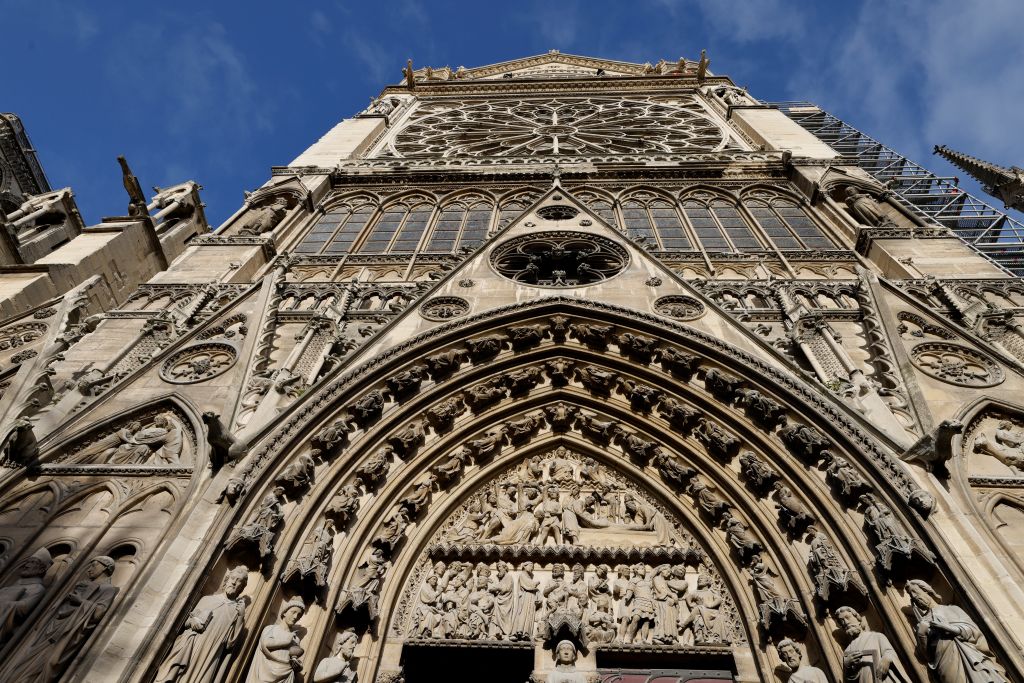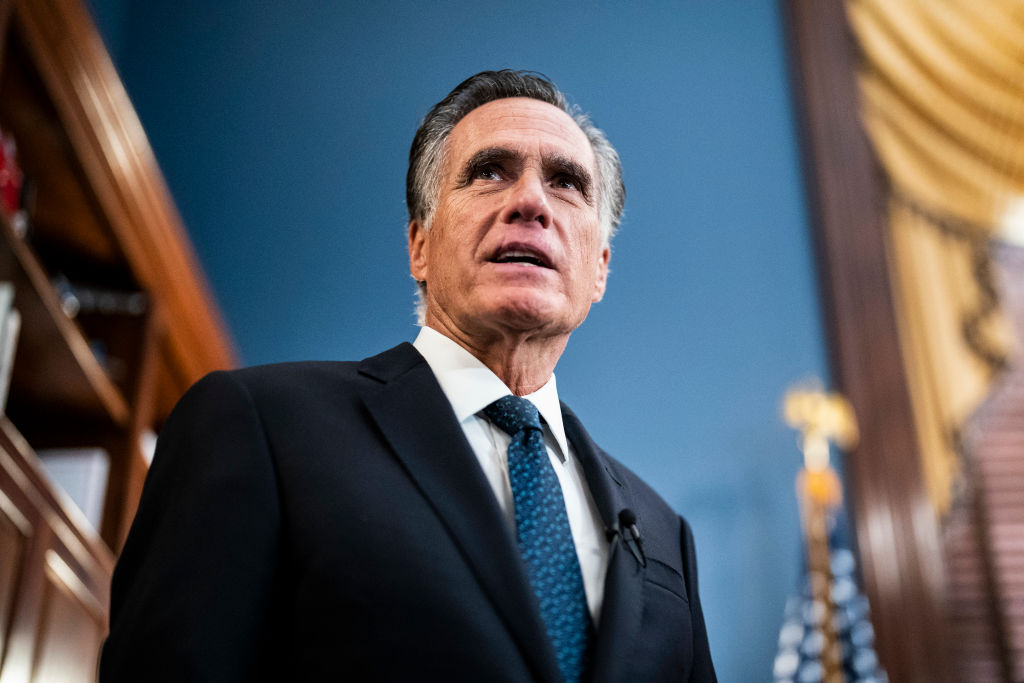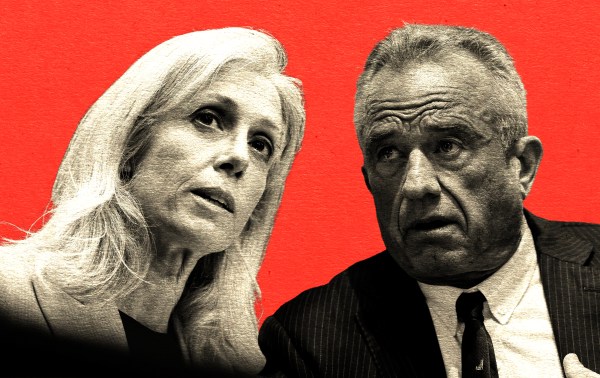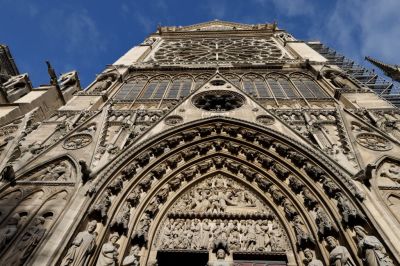Happy Sunday. Last weekend’s reopening of Notre Dame Cathedral brought world leaders to Paris and showcased the church’s historical and cultural importance. But what about its spiritual importance?
Today in Dispatch Faith, U.K.-based journalist Katja Hoyer (who grew up in socialist East Germany) brings an analytical eye to how cultural Christianity persists in an ever-secularizing Europe, even as its spiritual influence may have receded.
Katja Hoyer: Christianity’s Imprint Remains in a Secularizing Europe

The old church door creaks as it slowly falls shut behind me. I stand still, listening to its echo whispered back by the medieval stone walls. Though it’s colder inside than out, I take off my hat before I move with quiet reverence through remnants of a world that no longer exists.
At this church in Norfolk, England, there is an ornately carved box pew from which the local nobility once listened to sermons while ordinary folk sat in bench pews behind them. Next to it, a barely legible brass plaque on the ground says that “Heare under lieth George Duke Esquyre” who “dyed in the yeare of oure lorde 1551.” It’s not hard to picture George sitting right here with his wife and children.
I look around for information and find a leaflet that informs me I’m standing in a “redundant” church. Redundant? That means no longer needed and yet the guest book is filled with sentiments of awe. The last entry is from a couple of hikers visiting the same morning I did: “What a beautiful building!” I add my name to the list of admirers and step back out into the winter sunshine.
The visit has left me in a pensive mood. As I get ready to continue my walk, I turn around one last time and look at the little stone church. It appears forlorn amid the windswept fields of East England. Once, there must have been a small but tight-knit rural community here, and the church was woven into its social fabric.
Now only the occasional walker finds their way to a place that provided community, solace and spirituality for centuries. But does that make the church redundant? It’s not a new question, but one that takes on added meaning during the Advent season. As I ponder it, I’m reminded of the English poet Philip Larkin’s 1954 poem “Church Going.” In it, Larkin also stops at an abandoned church while out cycling. Looking at the structure, he wonders: “When churches fall completely out of use, what we shall turn them into.”
Larkin was deeply cynical about Christianity—“superstition, like belief, must die,” he declares in his poem. Nonetheless, he also harbored a deep reverence for ecclesiastical architecture: “For, though I’ve no idea what this accoutred frowsty barn is worth, it pleases me to stand in silence here.” In the end, Larkin argues, people will always be drawn to remnants of Christianity, sensing what they meant to their forebears, “and that much never can be obsolete.”
Larkin appears to have been right on both counts. Christianity as a practiced religion is in retreat in most European countries, yet its physical and cultural manifestations endure along with the sense of identity they represent. A 2018 Pew Research Center survey of 15 countries in Western Europe found that while secularization is now widespread—with half and more of the population in several countries saying they are neither religious nor spiritual—the majority of Europeans still identify as Christians.
In Europe, we may not go to church in the same numbers, but we still feel culturally embedded in the Christian tradition. Nowhere is this contrast more stark than in my home region. I have lived in the United Kingdom for several years now, but I was born in socialist East Germany, where four decades of atheist policies created what has sometimes been referred to as “the most godless place on earth.” The state collapsed with German reunification in 1990, but secularization continued. According to a study conducted by the University of Chicago, eastern Germany took a unique path in becoming and staying the only majority atheist society on earth.
I was only 5 years old when the state I was born into disappeared, but both before and after the fall of the Berlin Wall, I grew up in a world entirely devoid of religion. The first church service I remember attending was in the early 2000s when a friend’s sister married a (former) West German and the ceremony was held in his home church in a small town just north of Frankfurt. I still remember how strange it all seemed to me, the communal singing, the prayers, and the music.
Yet, even in East Germany, we were so steeped in cultural Christianity that the socialist dictatorship had to acknowledge its importance. The 500-year anniversary of Martin Luther’s birth, for instance, was marked with an entire “Luther Year” in 1983. Wartburg Castle, where he translated the New Testament into German, was restored at great expense in a state that permanently lacked building materials.
State leader Erich Honecker, an atheist originating from the Catholic Saarland state in West Germany, personally headed the “Luther Committee” that organized the festivities. Despite the atheist ideals he held up for his East German subjects, he expressed his hope that, to many of them, “a visit to the Wartburg will mean a strengthening of their feeling for their nation and for their homeland.”
After the 1990 reunification of Germany, Christianity’s cultural influence continued, even as Christian spirituality declined further. If you go to the eastern city of Dresden today, you will be able to visit its magnificent Frauenkirche, or Church of Our Lady. Its baroque splendor—designed in the 18th century to project the Lutheran faith the citizenry had acquired in the Reformation—dominates the cityscape today.
Yet the Frauenkirche that Dresden’s tourists flock to today only replicates the original, which was destroyed during British and American firebombing at the end of World War II. The East German regime decided to leave it in ruins as a war memorial—a counterpart to the ruins of Coventry Cathedral in England that had been destroyed by German bombing in 1940 and also remain as a memorial.
Yet even the socialist authorities began to make plans to rebuild the Frauenkirche in 1985 after reconstructing the iconic opera house in Dresden. After the fall of the Berlin Wall in 1989, a monumental and international fundraising effort revived the project and pushed it across the finish line. The British Dresden Trust involved the royal family, and the Association Frauenkirche Paris played a part. In the U.S., German-born Nobel Prize winner Günter Blobel donated his 1999 award money in memory of the church he’d known as a boy before his family fled.
The reconstructed Frauenkirche was consecrated in 2005. It was an inspiring international effort to give a Lutheran church back to a community that was no longer Lutheran. Only 21 percent of Dresdeners now belong to a religious community—16 percent of them are Protestant and 5 percent are Catholic. Since it gets so little use as a place of worship, the church feels oddly sterile—clean, full of tourists, and very consciously reconstructed with an exhibition detailing the process to visitors.
But restoring spirituality was always going to be impossible. What Dresden wanted to restore was part of its cultural heritage. What the Western world wanted to restore was a symbol of its history.
I was reminded of these dynamics more recently by the reopening of Notre Dame in Paris. The medieval cathedral had been closed since 2019, when a horrific fire engulfed it and destroyed much of the splendid architecture. I remember watching the footage on the news at the time, the devastation of such a magnificent ecclesiastical building pulling surprisingly painfully at my atheist heartstrings.
When French President Emmanuel Macron reopened it last week, he appeared visibly emotional. The bells of this iconic cathedral have “accompanied our history,” he said, and added, perhaps with a nod to the current political chaos in France, that “we must treasure this lesson of fragility, humility and will.” Notably, his speech was not primarily about religion but about Notre Dame as a symbol of France.
There were also surprisingly few Catholics among the high-profile attendees. U.S. President-elect Donald Trump, for instance, grew up Presbyterian and has more recently made remarks that he considers himself “to be a non-denominational Christian.” Another high-impact guest was Prince William, the heir to the British throne and future supreme governor of the Church of England. Neither were presumably there to pay homage to the Catholic church per se, but to French, European, and Western heritage.
Pope Francis seemed alone in hoping that “the rebirth of this admirable church would constitute a prophetic sign of the renewal of the Church in France,” as he put it in a message that was read during the cathedral’s reopening. But he will also know that this is unlikely. France is one of the most secular countries in the West. Its core principle of laïcité can be loosely translated as “secularism” but is a much more ideologically charged concept of keeping religion not just out of politics but also out of the public sphere.
Surveys indicate that less than half of the French population believes in God and only 12 percent of French Catholics attend church weekly. Yet “France is still deeply rooted in Christianity,” as the sociologist Philippe Portier has recently argued when explaining the significance of the reconstruction of Notre Dame. To him, “religious elements are still perceived by the French as a precious heritage because they help preserve the French identity, which seems to be dissolving in a changing world.”
Christianity acting as a cultural rather than a spiritual anchor to societies is a pattern we see around the world, including in the U.S., where secularization is commencing more slowly than in Europe. According to the Pew study, Americans unaffiliated with formal denominations still tend to be significantly more religious, praying to God in larger numbers. However, according to one long-term study, three-quarters of Americans now say they believe religion is losing its influence on American life, a number up from 55 percent before 2010.
Still, the decline in church attendance and the chipping away of religion from the public sphere don’t negate the role of Christianity as the bedrock of modern civilization in the West. Coming from a region where secularization was artificially accelerated, I believe what we’re witnessing isn’t the erosion of Christianity as such but its gradual transformation from a spiritual to a cultural backdrop. That makes me hopeful that ecclesiastical buildings—from grand cathedrals to rural parish churches—will never be “redundant.” We may not be sitting in them every Sunday anymore. But, in the words of Emmanuel Macron, they remind us that “we are bearing the legacy of something bigger than us.”
Samuel Benson: Mitt Romney’s American Theology

On the website today, Samuel Benson has a deep dive on retiring Sen. Mitt Romney’s farewell address earlier this month and how it reflects the uniquely American theology of his church:
Romney’s theologizing, as Religion News Service’s Jack Jenkins noted, is “simultaneously not that uncommon” yet “a bit unusual for an elected official to layer into a speech.” Even so, the premise at the heart of Romney’s assertion—that America must be good to merit God’s blessing—is a sharp deviation from the Christian nationalism percolating on the American political right. And yet, in keeping with Romney’s beliefs throughout his career, the idea is unapologetically, quirkily Mormon.
That the Church of Jesus Christ of Latter-day Saints would maintain a uniquely American theology is not surprising. Latter-day Saints leaders and scripture have emphasized the centrality of America in God’s plan since the church’s founding in the early 1800s. The Book of Mormon, the faith’s central scriptural tome, teaches that the American continent was kept hidden until God “wrought upon” explorers who led them there. Modern church leaders, recognized as prophets to the faithful, have declared that God helped the colonies win the American Revolution; that the U.S. Constitution was “divinely inspired”; and that the Constitution enabled a climate of religious freedom necessary for Christ’s restored church to be established in the 19th century.
The idea that America is blessed by God only if its people are righteous is repeated throughout the Book of Mormon. The book tells of a group of Jews who, six centuries before Christ’s birth, spread across the American continent and awaited the Messiah’s coming. The land on which they dwell is a “land of promise,” they are told; the land “shall be a land of liberty unto the Gentiles, and there shall be no kings upon the land.”
Kevin D. Williamson: An All-American Heretic

Also on the website today, something I bet you didn’t have on your bingo card: Kevin D. Williamson reviews hip-hop artist Kendrick Lamar’s new album and pulls no punches:
Of course, it wouldn’t be fair to hold a hip-hop album up to the standards of systematic theology, but Lamar invites the scrutiny—demands it, even. There isn’t any reason to take Lamar seriously as a religious thinker or critic, but that isn’t stopping him, and while listeners are submerged in his world there is no avoiding the issue. There isn’t any real point in trying to impose some kind of religious or intellectual coherence on the material, which will resist, robustly, any such effort. But it is worth digging in to try to get a read on the religious sensibility at play here, which is idiosyncratic and Lamar’s exclusively but which also touches something in a broader slice of American popular culture.
What it touches is delusion. Being compelled, as we Americans seem to be, to pathologize and medicalize every social phenomenon, it is tempting to call what’s at work here narcissism. But psychiatric terms are meant for troubled minds, and there is not much reason to believe that we are encountering one of those here. What Kendrick Lamar has is a highly creative mind processing a sick culture—and what Lamar’s sensibility and the culture have in common is that both lack the tools to deal in a rigorous way with the issues at hand and the tensions the rapper senses without quite being able to get his head around them. Lamar is in desperate need of T. S. Eliot’s escape from emotion and personality—he suffers from a suffocating excess of both.
But that is an occupational hazard for would-be messiahs. The Protestant emphasis on a personal relationship with God has its merits, to be sure, but it also is an invitation to make oneself the center of the universe. Kendrick Lamar has a powerful imagination, and he is a gifted storyteller—limited by his inability to comprehend that there are stories that are not about him. For Lamar, whether the subject is Lucifer or God or some unnamed guitarist rising to fame in the 1940s (many listeners assume that the unspoken name is that of John Lee Hooker), every Kendrick Lamar character is Kendrick Lamar.
The Dispatch Faith Podcast
Last week in this newsletter writer Megan Dent critiqued “gentle parenting,” a parenting philosophy that’s taken hold in recent years. On this week’s Dispatch Faith podcast, she joins me for an in-depth conversation about her essay, addresses criticism from readers, and explores ways she thinks gentle parenting can be helpful. Fair warning: I’m a father of four and she’s expecting her third child, so soapboxes and rabbit trails (hopefully all helpful) abound! And a reminder: My weekly conversations with Dispatch Faith contributors are available on our members-only podcast feed, The Skiff. Dispatch members can learn how to add it to their podcast platform of choice here. If you want to hear those more in-depth conversations with Dispatch Faith writers, join us!
More Sunday Reads
For The Atlantic, Molly Worthen has a profile of Bishop Robert Barron, the charismatic leader of Word on Fire Catholic Ministries who has become something of an influencer himself. “He generally steers clear of politics—and rarely misses a chance for a theological deep dive. ‘Dumbed-down Catholicism was a disaster, pastorally,’ Barron, who has a doctorate from the Catholic Institute of Paris, told me. ‘If you don’t think that young people have serious questions that need answers,’ he added later, ‘then you have not accompanied many young people.’ When Google invited him to speak at its headquarters in 2018, he lectured for an hour on Thomas Aquinas and the intellectus agens, ‘the restless, seeking, never satisfied mind.’ Barron plumbs topics that confound the secular world, such as transubstantiation and the Shroud of Turin. He wants to prove that Catholicism is not just another lifestyle choice based on the Golden Rule. The Word on Fire bookstore sells artwork meant to remind viewers just how unsettling the Christian story is: the Holy Spirit cascading onto the apostles in a torrent of lava; a pack of wolves ripping into the unresisting body of a lamb. If the ultimate source of meaning is ‘Jesus crowned, but with a crown of thorns, reigning, but reigning from a cross’ Barron said recently, ‘then we’re the weirdest religion around.’”
A Good Word
Greece is facing a crisis. Deaths in the country have outnumbered births since 2015, and small towns are dying off. Seeking to save such communities, the Greek government has begun looking to the Orthodox Church for help in enticing people to move some rural places and supporting them when they get there. In the small town of Fourna in central Greece, the measures have led to an interesting partnership, as Derek Gatopoulos and Thanassis Stavrakis report for the Associated Press. “The local schoolteacher, a Ph.D. student studying artificial intelligence, found common cause with the Rev. Constantine Dousikos, a burly Orthodox priest and former lumber machine operator who was ordained shortly before turning 50. They started a despair-fueled campaign to attract families to Fourna, offering settling-in money raised from private donations and municipal programs. It’s working: Two families have moved to the village, five more are on a 2025 wait list, and hundreds of others have made inquiries. Eight children now attend elementary classes. Dousikos, equally at ease behind the wheel of his pickup or in front of the church altar, says the initiative was partly inspired by calls from the Orthodox church hierarchy urging clergy to promote family life. ‘I think we did the obvious thing: Help the people here keep our village alive,’ he says, standing in the Church of Transfiguration of Christ on the main square.” One of those who came was Vassili Emmanouil and her six children. “Village residents leave food outside her door overnight and are encouraging her to restart an old bakery when her husband returns from a spell of work in Germany. ‘I’ve been here for nearly three months, and I would be ungrateful to say I’ve struggled,’ Emmanouil says. ‘The local priest and his wife treat me as if I’m part of their family. The entire village has been by our side, from offering daily essentials to emotional support.’”






Please note that we at The Dispatch hold ourselves, our work, and our commenters to a higher standard than other places on the internet. We welcome comments that foster genuine debate or discussion—including comments critical of us or our work—but responses that include ad hominem attacks on fellow Dispatch members or are intended to stoke fear and anger may be moderated.
With your membership, you only have the ability to comment on The Morning Dispatch articles. Consider upgrading to join the conversation everywhere.